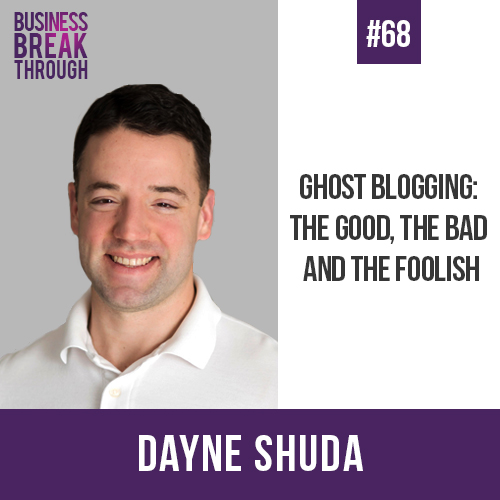68: Ghost Blogging: The Good, The Bad, and The Foolish with Dayne Shuda

So you’ve got your website up and now it’s time to bring in the traffic. Is blogging the best way to go? Will all those keywords really help your site to rank on Google?
In this episode, Dayne Shuda, owner of Ghost Blog Writers, opens up the big black SEO box, explaining everything you need to know including what short-tail and long-tail keywords are, how to do organic SEO and when it’s worth it to invest in a blog for your website. He also shares his struggle of finding loyal writers for his business, as well as some of his successful business processes such as his intake form for filtering applicants.
Join us for an episode packed with value!
My Guest: Dayne Shuda
Dayne Shuda graduated college in 2007 with a degree in business/entrepreneurship. His big plan was to create a niche social network. At the time MySpace was the big thing and Dayne thought he could figure out something similar on a smaller scale.
It failed… big time.
After that Dayne regrouped and started blogging for fun, while working full-time in marketing. Dayne would write about what he was learning, reading, etc. until something interesting happened – someone asked if he would write a weekly post for their business blog. Then he saw another small business owner ask the same thing on Twitter. Those were his first two clients as a freelance blogger.
And since 2012, Dayne has been running Ghost Blog Writers, a blogging agency, full-time with many ups and downs along the way.
Episode Highlights:
[5:06]: Like there’s an easy job- a couple hours a week, I’ll just throw some stuff up on Amazon, I’ll just write some stuff on a blog on my site, and poof, a bunch of money! It is a lot more complex than that. Hence, Dayne has an entire company of 10 years dedicated to it.
[10:34]: I definitely ran into a lot of business owners that expected the SEO thing to turn on within a month, three months, six months. And over the years, I’ve gotten better at saying upfront that’s not the case. If you’re looking for that, there are other places to spend your money. This is definitely a long term strategy.
[12:34]: So, say you say you sell baseballs. The term “baseball” would be a general keyword. The term “what are the laces in a baseball made out of?” is long tail, where not as many people are searching for it, but it’s a question that people are asking. Maybe not a lot of people, but you can still write a blog post that answers that question and helps a few people.
[21:35]: I would actually write seven posts in one afternoon, in about three hours on Sunday, and then schedule them for the full week. So it was about two, three hours of work, and I would generate 50,000 views a month. And I think that was the equivalent of maybe $500 to $1,000 a month at the peak.
[28:11]: The testing begins the moment they fill out the contact form. It’s not a long form, it’s not a complicated form. We see how they fill out the form, is it legible? Does it make sense? Are they skipping questions? So we kind of test them right away for their writing skills.
[30:39]: I made this entrepreneurship course, that I teach in high schools. And one of the questions I put on every test was their name, at the top of the page, and next to it, two points. You get points for putting your name on this line, over here, where I wrote it. And inevitably, in every class, there’d be one or two students who wouldn’t do it.
[37:07]: We’re struggling to- I would say people, freelance writers can easily find work. And that makes it difficult to retain people or give them enough. I think we treat people well, I think we pay a pretty good amount. It’s competitive. But we’re struggling to find loyal new writers. We’ve had writers that have been with us a long time. But if someone comes and tries it out, they might leave right away.
Quote:
Resources & Links:
- Find Dayne: Ghost Blog Writers
- Check out Dayne on Social: LinkedIn
- Work with Estie: www.strandconsulting.net
- Join us on the Show: www.estierand.com/breakthrough
Did you enjoy this episode? Then subscribe to my podcast on iTunes, so you can get automatic updates whenever another episode goes live (and you will be helping me get to #1 on iTunes, making us all cooler in the process!)

